
Maybe you're unhappy with your weight. You've tried many diets, but nothing works. You might even have a closet full of diet books, weight loss supplements, and unused gym equipment to prove it. Now, you're considering another approach to weight loss - calorie measurement. This method focuses less on what you eat and more on how much you eat. Tracking calories helps you understand how different foods affect your body and can identify the foods that help create sustainable weight loss. Eating 1000 calories a day can help you jumpstart your weight loss goals and see results quickly so that you can get excited about your journey again. But, how are calories measured? This article will help you navigate the world of calorie measurement and provide insights on the what, why, and how of eating 1000 calories a day.
Cal AI's calorie tracker makes it easy to calculate your daily caloric needs and stay on track with your weight loss goals. With this simple tool, you can achieve noticeable weight loss quickly and sustainably without compromising your health or well-being.
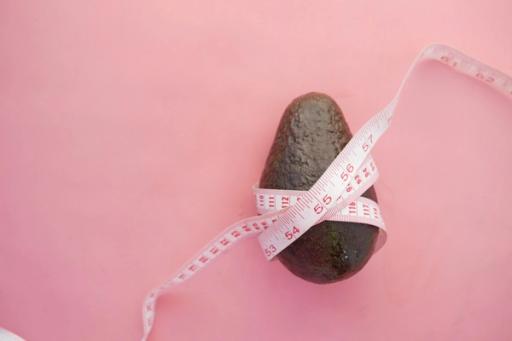
At a Glance: 1000-Calorie Diet
The 1,000-calorie diet limits daily caloric intake to 1,000 calories. This very low-calorie diet is designed to reduce caloric consumption substantially. The primary goal of this plan is rapid weight loss, often under medical supervision in specific cases. This program typically involves eating nutrient-dense, portion-controlled meals while avoiding high-calorie foods. It may not suit everyone and is usually recommended for short-term use.
To lose weight, newcomers must create a calorie deficit. This entails burning more calories than you consume, forcing your body to use fat as fuel. The 2,000-calorie-a-day figure first appeared in the US Recommended Daily Allowances RDAs in 1968. This standard was created as a reference point to assist people of all ages and genders maintain a healthy diet and lifestyle.
Nevertheless, the global obesity problem and changes in our food industry have resulted in stricter guidelines for our daily calorie consumption. The new recommendation encourages very low-calorie diets by limiting your calorie intake to a maximum of 1,000 per day.
When planning a 1,000-calorie diet, you must consume the correct food type for optimal health. Below are a few basics you should keep in mind if you ever consider trying a very low-calorie diet:

A calorie deficit is the golden rule when it comes to losing weight. Creating a calorie deficit means burning more calories than you are taking in. A low-calorie diet induces weight loss by decreasing your energy intake to help make this deficit. For instance, a 1,000-calorie diet will drop your caloric intake significantly and likely result in weight loss.
The number of calories you eat daily does not solely determine how quickly you will lose weight. Other factors, like your metabolism, activity level, and starting weight, will also influence the rate of weight loss.
Eating 1,000 calories a day often results in weight loss due to significantly reducing energy intake. But, the weight loss may not be sustainable and could have unwanted side effects.
A low-calorie diet induces weight loss, but lowering your calories too much can hamper your results. In cases where extreme obesity causes medical complications, a 1,000-calorie diet may be prescribed to initiate quick weight loss.
But trying such a diet on your own puts you at risk of developing nutritional deficiencies, stalling your metabolism and losing valuable muscle mass. Reduce your calorie intake to a healthy level for your body, and add exercise to lose weight gradually.
Although it's recommended that you create a calorie deficit of 500 to 1,000 calories daily to lose 1 to 2 pounds a week, this rate may be too aggressive for some people. If achieving that rate requires extreme deprivation, you will unlikely stick to the plan. Diets that dip below 1,200 calories per day are complicated to adhere to for any length of time because, essentially, you're starving your body.
You may lose weight quickly on a 1,000-calorie diet, but the lost weight is mostly water and lean mass, not fat. It's nearly impossible for you to get all the vitamins and minerals you need, even at 1,200 calories per day, especially if you're a woman of childbearing age.
When you follow a 1,000-calorie plan, any weight you lose will likely return fairly quickly once you resume eating a regular meal plan. Your lingering hunger from such a restrictive plan could even cause you to compensate by overeating, which could contribute to gaining the weight back.
Low-calorie diets are recommended to lose weight because they help create a deficit between the calories you burn and those you take in. When your body uses more energy in the form of calories than it takes in, fat is lost. Trimming caloric intake isn't the only way to create this deficit.
Consider upping the energy you use daily through physical activity and daily functions, like fidgeting and walking, to lose weight. The American College of Sports Medicine advocates 250 minutes of moderate-intensity cardiovascular activity per week to spur significant weight loss.
A diet containing between 1,200 and 1,400 calories is still considered low calorie and will prompt weight loss in most people, even in sedentary women. Because of their larger size and subsequently more significant energy needs, men might require approximately 1,800 calories per day to lose weight safely and keep it off.
Choosing quality foods that offer optimal nutrition and satiation when trying to drop pounds is critical. Fill your plate with many nutrient-dense but calorie-light, green, watery vegetables. Lean protein helps you feel full, so choose skinless chicken or turkey, lean beef, fish or eggs at most meals.
Include whole grains because they contain fiber, which takes longer to digest, and avoid refined grains such as white bread. Processed foods manage to pack a lot of calories into small servings, so avoid them. If you need a low-calorie snack, choose fresh fruit or low-fat, plain yogurt with berries.
Sometimes, people on a 1,200-calorie-per-day diet don't lose weight and think they must trim their intake more to get results. Chances are, they're underestimating their daily caloric intake. They may simply forget about a snack they ate, get so hungry that they eat a larger serving than they had planned, or don't measure and weigh their food to ensure they're on track.
If you've hit a weight loss plateau on a 1,200-calorie diet, weigh your portions and try writing down everything you eat so you don't forget a food item or two.
When your weight seriously endangers your health, or you're prepping for an intense obesity treatment, such as bariatric surgery, your doctor may prescribe a very low-calorie diet of 800 calories or a low-calorie diet of 1,000 calories a day. This calorie limit is usually prescribed to women, as it's considered too low for most men, who are restricted to 1,200 to 1,600 calories a day on medically prescribed low-calorie plans.
In such cases, the 1,000-calorie diet is designed by a dietitian and usually consists of small portions of whole foods, but it may include meal replacements to help you get all the requisite vitamins, minerals and fiber you need.
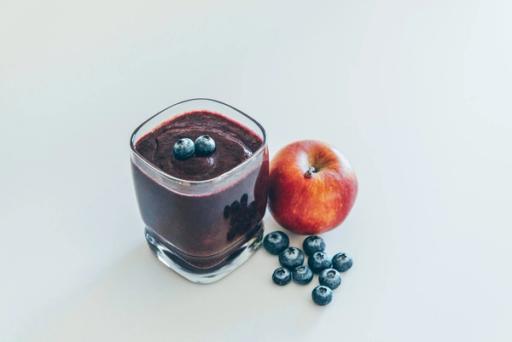
Incorporating nutrient-dense foods low in calories is the key to creating a healthy 1,000-calorie meal plan. Nutrient-dense foods contain many vitamins, minerals, antioxidants, and other beneficial compounds related to their calorie content. Such foods help boost overall health and prevent nutritional deficiencies while on a low-calorie diet.
A 1,000-calorie meal plan should include a variety of foods from all the different food groups for a well-balanced approach to weight loss.
This 1000-calorie diet chart is a sample menu that can be followed by anyone who wants to lose weight drastically.
The plan may vary based on your weight and physical activity. Consult a doctor or a dietitian to adjust it according to your body’s requirements.
Variation 1
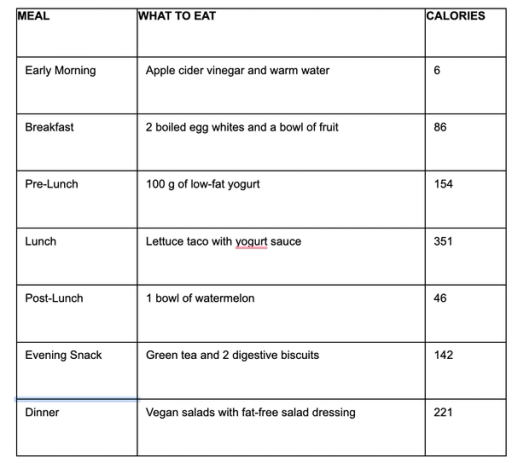
Total Calorie Intake: 1008
Useful Tip: You can also have green tea in the morning instead of a detoxification drink.
Green tea has 0 calories. A study on mice states that it is rich in the antioxidant epigallocatechin gallate (EGCG) that has an anti-obesity effect. Nevertheless, its excess intake can cause electrolyte imbalance. Hence, practice moderation.
Variation 2
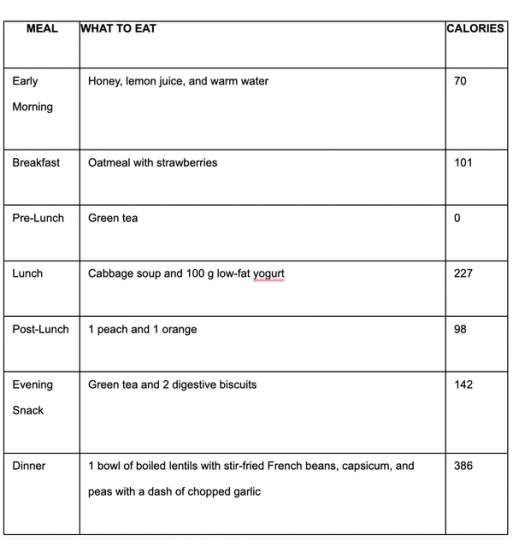
Total Calorie Intake: 1024
Variation 3
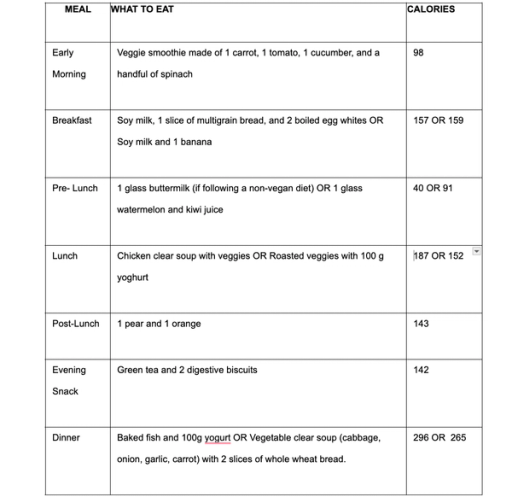
Total Calorie Intake: 1050
Cal AI is changing how we think about calorie tracking to achieve our nutrition goals. No more tedious manual logging or endless searching through food databases to find the correct entry. Now, with Cal AI's cutting-edge artificial intelligence, you simply snap a photo of your meal, and the app does the rest.
It's like having a personal nutritionist right on your smartphone. Cal AI combines your phone's depth sensor with advanced AI models to analyze food volume, identify ingredients, and instantly calculate calories, protein, carbs, and fat content. With 90% accuracy on visible foods, we've made nutrition tracking effortless.
Whether scanning a full meal or a quick snack, Cal AI gives you accurate nutritional information in under 15 seconds. Plus, our AI learns from your feedback, continuously improving its accuracy. Stay on track with personalized insights and smart reminders; Cal AI simplifies achieving your fitness goals.
Track your calories with your camera with Cal AI's AI calorie tracker today!